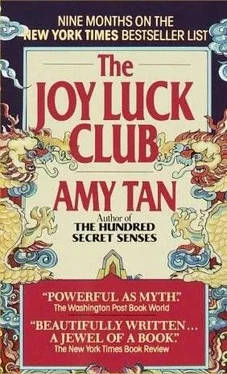In Popo's room my auntie protested, "Too late, too late," as my mother approached the bed. But this did not stop my mother.
"Come back, stay here," murmured my mother to Popo. " Nuyer is here. Your daughter is back." Popo's eyes were open, but now her mind ran in many different directions, not staying long enough to see anything. If Popo's mind had been clear she would have raised her two arms and flung my mother out of the room.
I watched my mother, seeing her for the first time, this pretty woman with her white skin and oval face, not too round like Auntie's or sharp like Popo's. I saw that she had a long white neck, just like the goose that had laid me. That she seemed to float back and forth like a ghost, dipping cool cloths to lay on Popo's bloated face. As she peered into Popo's eyes, she clucked soft worried sounds. I watched her carefully, yet it was her voice that confused me, a familiar sound from a forgotten dream.
When I returned to my room later that afternoon, she was there, standing tall. And because I remember Popo told me not to speak her name, I stood there, mute. She took my hand and led me to the settee. And then she also sat down as though we had done this every day.
My mother began to loosen my braids and brush my hair with long sweeping strokes.
"An-mei, you have been a good daughter?" she asked, smiling a secret look.
I looked at her with my know-nothing face, but inside I was trembling. I was the girl whose belly held a colorless winter melon.
"An-mei, you know who I am," she said with a small scold in her voice. This time I did not look for fear my head would burst and my brains would dribble out of my ears.
She stopped brushing. And then I could feel her long smooth fingers rubbing and searching under my chin, finding the spot that was my smooth-neck scar. As she rubbed this spot, I became very still. It was as though she were rubbing the memory back into my skin. And then her hand dropped and she began to cry, wrapping her hands around her own neck. She cried with a wailing voice that was so sad. And then I remembered the dream with my mother's voice.
I was four years old. My chin was just above the dinner table, and I could see my baby brother sitting on Popo's lap, crying with an angry face. I could hear voices praising a steaming dark soup brought to the table, voices murmuring politely, " Ching! Ching!" -Please, eat!
And then the talking stopped. My uncle rose from his chair. Everyone turned to look at the door, where a tall woman stood. I was the only one who spoke.
"Ma," I had cried, rushing off my chair, but my auntie slapped my face and pushed me back down. Now everyone was standing up and shouting, and I heard my mother's voice crying, "An-mei! An-mei!" Above this noise, Popo's shrill voice spoke.
"Who is this ghost? Not an honored widow. Just a numberthree concubine. If you take your daughter, she will become like you. No face. Never able to lift up her head."
Still my mother shouted for me to come. I remember her voice so clearly now. An-mei! An-mei! I could see my mother's face across the table. Between us stood the soup pot on its heavy chimney-pot stand-rocking slowly, back and forth. And then with one shout this dark boiling soup spilled forward and fell all over my neck. It was as though everyone's anger were pouring all over me.
This was the kind of pain so terrible that a little child should never remember it. But it is still in my skin's memory. I cried out loud only a little, because soon my flesh began to burst inside and out and cut off my breathing air.
I could not speak because of this terrible choking feeling. I could not see because of all the tears that poured out to wash away the pain. But I could hear my mother's crying voice. Popo and Auntie were shouting. And then my mother's voice went away.
Later that night Popo's voice came to me.
"An-mei, listen carefully." Her voice had the same scolding tone she used when I ran up and down the hallway. "An-mei, we have made your dying clothes and shoes for you. They are all white cotton."
I listened, scared.
"An-mei," she murmured, now more gently. "Your dying clothes are very plain. They are not fancy, because you are still a child. If you die, you will have a short life and you will still owe your family a debt. Your funeral will be very small. Our mourning time for you will be very short."
And then Popo said something that was worse than the burning on my neck.
"Even your mother has used up her tears and left. If you do not get well soon, she will forget you."
Popo was very smart. I came hurrying back from the other world to find my mother.
Every night I cried so that both my eyes and my neck burned. Next to my bed sat Popo. She would pour cool water over my neck from the hollowed cup of a large grapefruit. She would pour and pour until my breathing became soft and I could fall asleep. In the morning, Popo would use her sharp fingernails like tweezers and peel off the dead membranes.
In two years' time, my scar became pale and shiny and I had no memory of my mother. That is the way it is with a wound. The wound begins to close in on itself, to protect what is hurting so much. And once it is closed, you no longer see what is underneath, what started the pain.
I worshipped this mother from my dream. But the woman standing by Popo's bed was not the mother of my memory. Yet I came to love this mother as well. Not because she came to me and begged me to forgive her. She did not. She did not need to explain that Popo chased her out of the house when I was dying. This I knew. She did not need to tell me she married Wu Tsing to exchange one unhappiness for another. I knew this as well.
Here is how I came to love my mother. How I saw in her my own true nature. What was beneath my skin. Inside my bones.
It was late at night when I went to Popo's room. My auntie said it was Popo's dying time and I must show respect. I put on a clean dress and stood between my auntie and uncle at the foot of Popo's bed. I cried a little, not too loud.
I saw my mother on the other side of the room. Quiet and sad. She was cooking a soup, pouring herbs and medicines into the steaming pot. And then I saw her pull up her sleeve and pull out a sharp knife. She put this knife on the softest part of her arm. I tried to close my eyes, but could not.
And then my mother cut a piece of meat from her arm. Tears poured from her face and blood spilled to the floor.
My mother took her flesh and put it in the soup. She cooked magic in the ancient tradition to try to cure her mother this one last time. She opened Popo's mouth, already too tight from trying to keep her spirit in. She fed her this soup, but that night Popo flew away with her illness.
Even though I was young, I could see the pain of the flesh and the worth of the pain.
This is how a daughter honors her mother. It is shou so deep it is in your bones. The pain of the flesh is nothing. The pain you must forget. Because sometimes that is the only way to remember what is in your bones. You must peel off your skin, and that of your mother, and her mother before her. Until there is nothing. No scar, no skin, no flesh.
Lindo Jong
I once sacrificed my life to keep my parents' promise. This means nothing to you, because to you promises mean nothing. A daughter can promise to come to dinner, but if she has a headache, if she has a traffic jam, if she wants to watch a favorite movie on TV, she no longer has a promise.
I watched this same movie when you did not come. The American soldier promises to come back and marry the girl. She is crying with a genuine feeling and he says, "Promise! Promise! Honey-sweetheart, my promise is as good as gold." Then he pushes her onto the bed. But he doesn't come back. His gold is like yours, it is only fourteen carats.
Читать дальше












